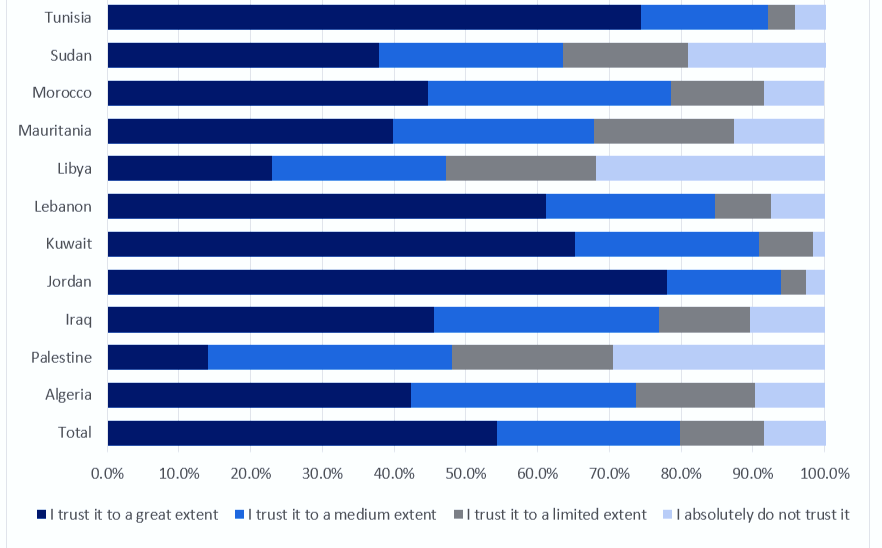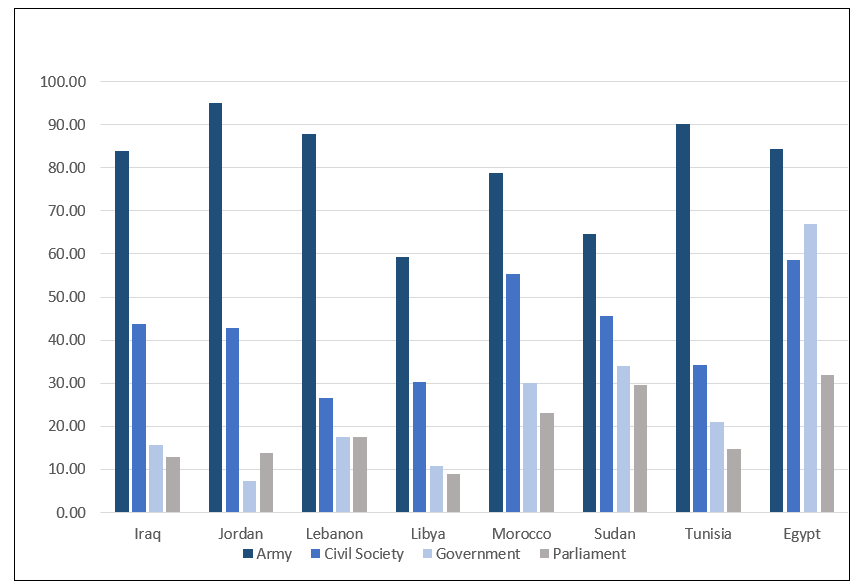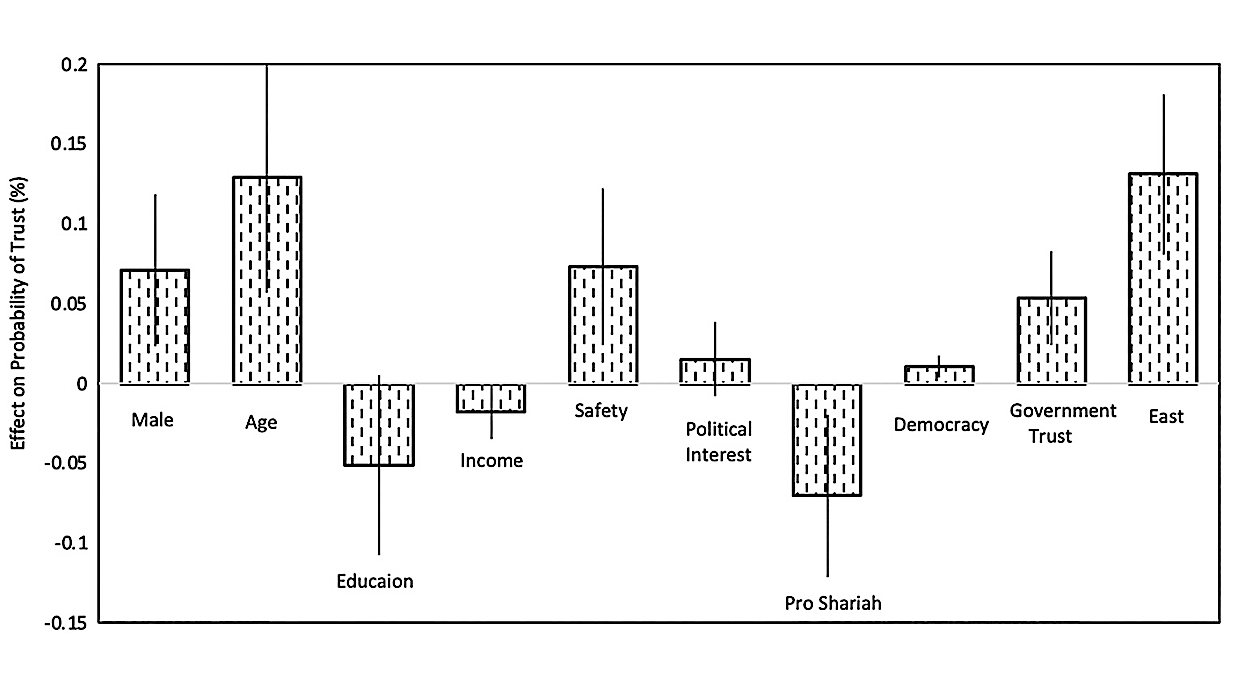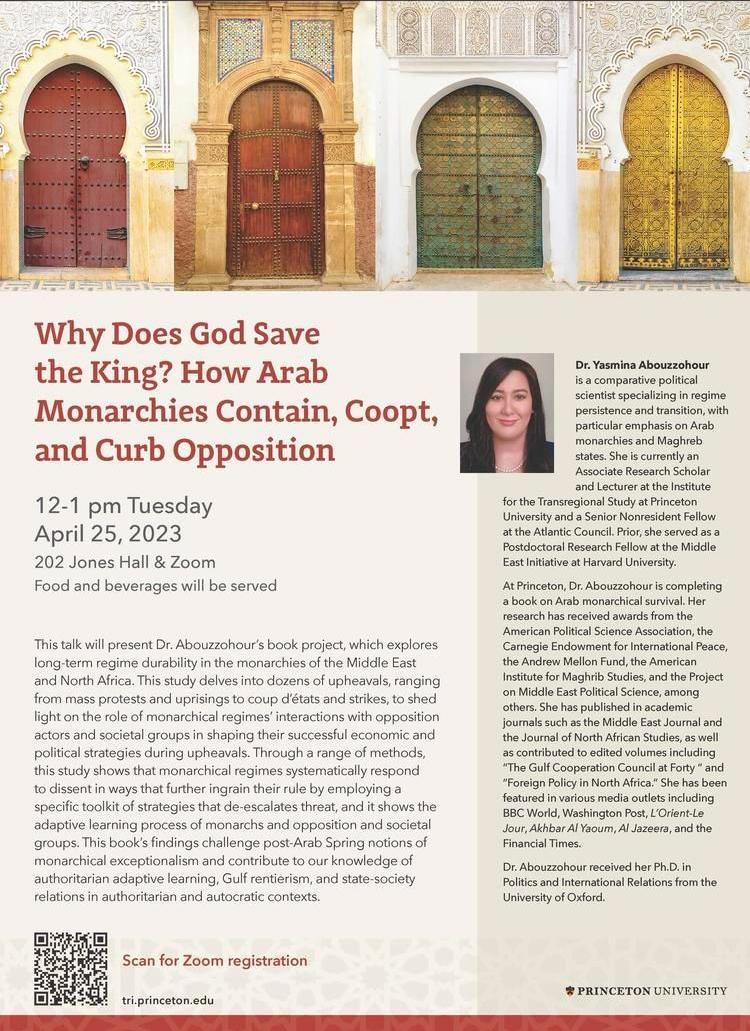What Drives Public Trust in the Military?
What explains the high levels of trust that citizens place in the armed forces? The institution of the military is making a comeback, as coups multiply in Africa, generals draw nearer to the political sphere in Latin America, and armies gain popularity at the expense of other institutions in the Middle East. In fact, according to public opinion surveys from around the world, the military is one of the most trusted national institutions in both democratic and non-democratic countries, exceeding the levels of confidence accorded by citizens to civilian government, elected officials, and the news media.
This multi-phase project employs survey data to determine the conditions that lead to high public trust in the military across regime types in the Middle East, Africa, and Latin America. Grounded in the theoretical frameworks of institutional trust and authoritarian persistence, this project explores the impact of various factors on trust in the military over time, including those related to well-being, ideology, and trust in other institutions. It also considers how regime type, armed conflict, and external relations affect the drivers of trust in the military in different contexts. This project consists of three phases:
Regional analysis: Middle East and North Africa
This working paper investigates the conditions that drive trust in the military across the Middle East and North Africa (MENA) region. Our research identifies several factors that should influence MENA citizens' likelihood of trusting their armed forces based on studies of civil-military relations and institutional trust and the growing political economy literature on the role of militaries in the MENA region. These include personal safety, economic class, political conservatism, Islamist orientation, trust in institutions, and attitudes toward democracy.
We empirically examined these factors using data from the Arab Barometer Wave V survey collected between 2018 and 2019, a time when protests took place across the region, and armies were consequently deployed to varying degrees across countries. The data comprises some 10,000 responses from nationally representative samples across nine countries. Four of these countries have civilian-led governments (Jordan, Lebanon, Morocco, and Tunisia), and five have an extended history of military intervention or rule (Egypt, Iraq, Libya, Sudan, and Yemen). This allows us to examine whether the drivers of trust in the armed forces vary under military versus civilian rule.
Cross-regional analysis: Africa, Latin America, and the Middle East
In Africa, home to the highest number of coup d'états in modern history- with six successful coups since 2020- survey data show that approximately 62% of over 50,000 Africans expressed significant trust in their armed forces in 2022. In the Middle East, where armies are routinely deployed to put down mobilization, around 70 percent of surveyed citizens in eleven MENA countries trusted the armed forces a great deal or quite a lot. Latin American militaries, which historically led repressive regimes and interfered in political processes, are wading back into politics, often at the behest of civilian leaders. There, over 65% of surveyed citizens expressed significant trust in the armed forces.
Our paper sheds light on this phenomenon by investigating the conditions that lead to heightened trust in the armed forces and exploring how regime type, war, conflict, and coup frequency impact trust in this institution. After critically reviewing the political science, sociology, and psychology works on institutional trust in non-democracies, support for the military and militarism, we select relevant variables that measure well-being, political ideology, and trust in other institutions. Drawing on this framework, we formulate a set of hypotheses that we test using nationally representative data from the Arab Barometer Survey, the AmericasBarometer Survey, and the Afrobarometer Survey in 81 countries in 2022.
In-country analysis
The first published article from this project focuses on post-2011 Libya and finds a confluence of factors driving trust in the military, pointing to regional, generational, educational, and class divides. It contributes to the sparse data-driven body of work on trust in the military in non-democracies, backsliding and autocratization in conflict countries, and political attitudes in Libya.
Trust in the Military in MENA 2019

High and Medium Trust in the Armed Forces vs. Other Institutions in the Middle East (2019)

Yasmina Abouzzohour, Michael Robbins, Tarik M. Yousef, “What Drives Public Trust in the Military? Evidence from the Middle East and North Africa.” 2023 American Political Science Association Annual Meeting Working Paper, Los Angeles, California.
How Variables Affect Trust in the Army: Libya Case Study

Yasmina Abouzzohour and Tarik M. Yousef. "What drives public trust in the military in non-democracies: Evidence from Libya (2014-2019)." Journal of North African Studies. 28 (6), 2023.
Book Project
Why Does God Save the King?
How Monarchies Endure and Evolve in the Middle East and North Africa
How did monarchies survive the Arab Spring and withstand the tide of revolutions, rebellions, civil wars, and military coups that preceded it? My book project investigates long-term regime endurance in Arab monarchies, some of the world’s most robust autocracies. Specifically, delving into dozens of upheavals, ranging from mass protests and uprisings to coup d’états and strikes, this study uses a range of methods to shed light on the role of monarchical regimes’ interactions with opposition actors and citizens in shaping their economic and political strategies during upheavals. I argue that monarchical regimes systematically respond to dissent in ways that further ingrain their rule by using a specific toolkit of strategies that de-escalates threat. My research advances empirical and theoretical contributions about the impact of threat perception, adaptive learning, and the interrelationship between regimes, opposition actors, and citizens on authoritarian endurance and autocratization.
This study is constructed around a three-part, in-depth explanatory case study: Its main theory is generated through a cross-country analysis of all monarchies, further developed and tested through a fine-grained comparison of different categories of monarchies, and confirmed through a study of collapsed regimes. Leveraging semi-structured interviews, primary and secondary sources from opposition actors, and dataset analysis, this study delves into dozens of opposition events and explores the process of adaptive authoritarian learning that leads Arab monarchies to de-escalate political and socioeconomic threats, contain opposition, and endure. Framed in a way that facilitates broader application, my research's fundamental components- regime behavior, regime-opposition interrelationships, and threat perception- have wider applicability to regime survival in other types of authoritarian systems within and beyond the MENA region.
Book Talk

Journal Articles
- Abouzzohour, Yasmina, and Tarik M. Yousef. "What drives public trust in the military in non-democracies: Evidence from Libya (2014-2019)." Journal of North African Studies. 28 (6), 2023.
- Abouzzohour, Yasmina. “How do liberalized autocracies repress dissent?” Middle East Journal. 75 (2) pp. 264-284, 2021.
- Abouzzohour, Yasmina, and Beatriz Tome-Alonso. “Moroccan Foreign Policy After the Arab Spring: A Turn for The Islamists or Persistence of Royal Leadership?” Journal of North African Studies. 24 (3) pp. 444-467, 2019.
Working Papers
- Yasmina Abouzzohour, Michael Robbins, and Tarik M. Yousef, "What Drives Public Trust in the Military: Evidence from the Middle East & North Africa.”
- Yasmina Abouzzohour, “Re-visiting Regime Persistence during Upheavals: Does Regime Type Matter?”
- Yasmina Abouzzohour, “The Geopolitics of Renewable Energy: A New Theory.”
Ongoing Works
- Yasmina Abouzzohour and Tarik M. Yousef, "What Drives Trust in the Military? Evidence from Africa, Latin America, and the Middle East.”
- Yasmina Abouzzohour and Safa Al-Saeedi, “Public Perception of Tax Reform in Rentier States.”
- Yasmina Abouzzohour and Tarik M. Yousef, "Assessing Polarization in Conflict States.”
- Yasmina Abouzzohour and Oumeyma Chelbi, “Tax Reform and State-Society Relations in the Gulf.”
Book Chapters
- Abouzzohour, Yasmina. “A New Chapter for Intraregional Relations? Cohesion, Crises, and Clashes In The Gulf Cooperation Council.” In The Gulf Cooperation Council at Forty: Risk and Opportunity in a Changing World, 1st ed. Washington: Brookings Institution Press, 2022.
- Abouzzohour, Yasmina and Beatriz Tome-Alonso. “Moroccan Foreign Policy After the Arab Spring.” with Beatriz Tome-Alonso. In Foreign Policy in North Africa: Navigating Global, Regional and Domestic Transformations. Abingdon: Routledge, 2020.
Academic Essays
- Yasmina Abouzzohour, “The Amplification of Authoritarianism in the Middle East and North Africa,” in Project on Middle East Political Science Studies. 47, pp. 12-18, 2022.
- Yasmina Abouzzohour, "Coronavirus in the Maghreb: Responses and Impacts,” In Project on Middle East Political Science Studies. 39, pp. 51-55. 2020.
- Yasmina Abouzzohour, "The Persistent Rural Failure of Morocco’s Justice and Development Party," in Project on Middle East Political Science Studies. 27, pp. 12-19, 2017.
Other Publications (Refereed)
- Yasmina Abouzzohour, “Heavy Lies the Crown: The survival of Arab monarchies, Ten Years after the Arab Spring,” Order from Chaos. 2021.
- Yasmina Abouzzohour, “Libya’s peace process: What’s at stake for the Maghreb, 10 years after Gadhafi’s overthrow” Order from Chaos. 2021.
- Yasmina Abouzzohour, “Oman, Ten Years After the Arab Spring: The Evolution of State-Society Relations,” Chatham House and the Arab Reform Initiative. 2021.
- Yasmina Abouzzohour, “Breaking the impasse on Algeria’s political and economic crises,” World Politics Review. 2021.
- Yasmina Abouzzohour, “Caught in transition: Tunisia’s protests and the threat of repression,” European Council on Foreign Relations. 2021.

